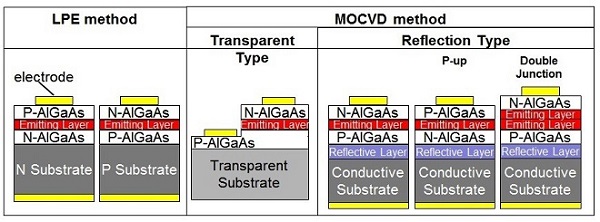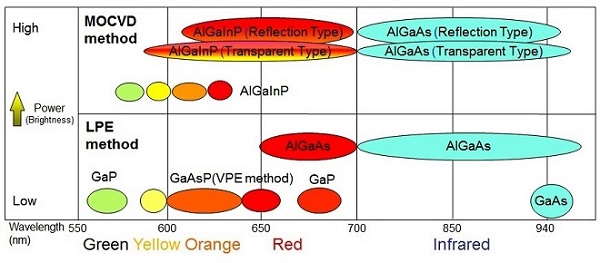Showa Denko (SDK) has expanded its product lineup of infrared LED chips (IR-LEDs), which are mainly used as parts of photo-couplers for gate drivers in power semiconductor modules and parts of sensors for IoT-related devices.
SDK’s product lineup of IR-LEDs has three categories, namely, conventional LEDs made with Liquid Phase Epitaxy (LPE) method, transparent type LEDs and reflection type LEDs made with Metal Organic Chemical Vapor Deposition (MOCVD) method. Since SDK’s IR-LEDs have some good characteristics like a power linearity at lower electric current and a quick response time at high speed cycle, they are widely used as parts for equipment that require high reliability such as industrial equipment, automotive equipment, medical devices, and security systems.
Reflection type LED is an LED chip which enhances its output with a mirror layer formed under the light emission layer to reflect the light beam upward. Reflection type LEDs have been used as parts of photoelectric sensors for industrial equipment and other devices. This time, SDK upgraded its technology to manufacture reflection type LEDs, and successfully added “Double Junction Reflection Type LED” and “P-up Reflection Type LED” to its product lineup of IR-LEDs.

|
|
SDK offers three structure-types of LED chips with different spectrums and outputs. (Image: Showa Denko) |
1) Double Junction Reflection Type LED
This LED chip has two light emission layers, and realizes output nearly twice as much as that of conventional reflection type LED. It is suitable for uses that require high output LEDs such as biometric sensors, surveillance or security cameras, virtual reality, and sensors for automotive equipment.
2) P-up Reflection Type LED
This product has a polarity reversed from that of N-up structure, which is the mainstream structure of conventional reflection type LEDs. To manufacture IR-LEDs, LPE method is widely used, and this method is mainly used to produce LEDs with P-up structure. To respond to the requests from customers who desire to develop high-power modules which are compatible with circuit designs for conventional P-up non-reflection type LEDs, SDK has developed this new product, P-up Reflection Type LED. P-up Reflection Type LED gives our customers more choices of chip structures and more degree of freedom in designing of circuits for packages and modules.

|
|
SDK offers LED chips that cover all wavelengths except blue. (Image: Showa Denko) |
SDK has a history of 40 years as long-established LED chip manufacturer, produces and sells many types of LEDs including aluminum-gallium-indium-phosphide (AlGaInP) LEDs, gallium-arsenide (GaAs) LEDs, and gallium-phosphide (GaP) LEDs. In recent years, SDK has been expanding its IR-LED business. In addition to the abovementioned efforts to develop new LED chips in its main factory, Chichibu Plant, SDK acquired all shares of Shoko Electronics Corporation (SKEC) from Shoko Co., Ltd. to make it a wholly-owned subsidiary. SKEC is an LED chip manufacturer, whose production base is located in Hioki City, Kagoshima Prefecture, and manufactures IR-LED chips for industrial equipment, automotive equipment, and consumer appliances and LED chips for displays. Through acquisition of SKEC, SDK has established a supply system of LED chips with two production bases, namely SDK’s Chichibu Plant and SKEC, integrated the two companies’ technologies and quality-control know-how to obtain synergy effect, and established a system to supply wide variety of LED chips to the LED market that has diversified needs.
SDK Group’s IR-LED chips are acclaimed by manufacturers of photo-couplers and sensors in the market. The market for IR-LEDs is expected to expand concurrently with the expansion of IoT-related device market. SDK will continue to expand its lineup of LED products, and respond to the needs of the market.













